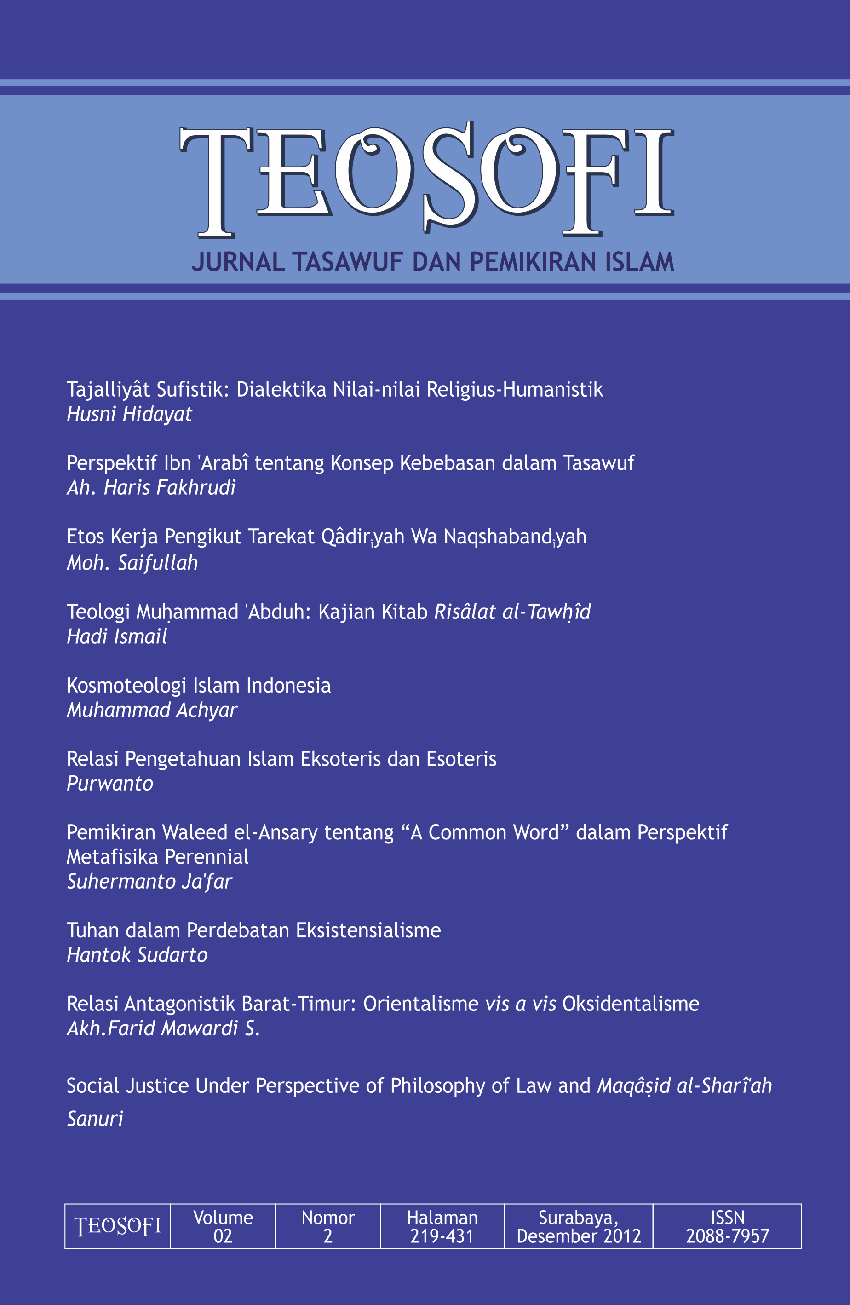Perspektif 'Ibn Arabi tentang Konsep Kebebasan dalam Tasawuf
Main Article Content
Abstract
This paper will discuss the meaning of freedom in the discourse of Sufi thought, especially of Ibn ‘Arabî. This is based on the consideration that Sufism before Ibn ‘Arabî’s more focused on ritualistic orientation for students and only revealed a variant of Sufi’s expressions, both on maqâmât and ahwâl. Therefore, the presence of Ibn ‘Arabî became the turning point in the discourse of Sufism by expressing his beliefs in the theoretical formulation. The doctrine of Sufism—which previously only implicitly contained in the words of the Sufi shaykh—in the hands of Ibn ‘Arabî flashed into an open, theoretical, and obvious and thus opened the door for anyone who has a high intelligence in reflecting at once and realizing the metaphysical theories through operational forms. Therefore, this article will discuss some of the key concepts in the thought of Ibn ‘Arabî including the meaning of freedom (al-hurrîyah) in Sufism, maqâm hurrîyah, and hâl hurrîyah obtained by the Sufis during their spiritual journey.
Downloads
Article Details

This work is licensed under a Creative Commons Attribution-NonCommercial 4.0 International License.
Licensing
© The Author(s). Published by Department of Aqidah and Islamic Philosophy, Faculty of Ushuluddin and Philosophy, Sunan Ampel State Islamic University Surabaya, Indonesia.
This is an Open Access article distributed under the terms of Attribution-NonCommercial 4.0 International (CC BY-NC 4.0).
References
‘Arabî, Muhy al-Dîn Ibn. Al-Futûhât al-Makkîyah, tahqiq ‘Uthmân Yahyâ. Kairo: al-Hayah al-Misrîyah al-‘Âmmah li al-Kitâb, 1992.
-----. Fusûs al-Hikam, komentator Abû al-A’lâ al-‘Afîfî. Kairo: Dâr al-Ihyâ’ al-‘Arabîyyah, 1946.
Arabi, Ibnu. Risalah Kemesraan, terj. Hodri Ariev. Jakarta: Serambi, 2005.
Badawî, ‘Abd. al-Rahmân. Mawsû’ah al-Falsafah, Vol. 1. Beirut: al-Mu’assasah al-‘Arabîyah li al-Dirâsât wa al-Nashr, 1984.
Ghurâb (al), Mahmûd Mahmûd. al-Hubb wa al-Mahabbah al-Ilâhîyah min Kalâm al-Shaykh al-Akbar Muhy al-Dîn Ibn ‘Arabî. Damaskus: Matba‘ah al-Kâtib al-‘Arabî, Cet. Ke-2, 1992.
Hanbalî (al), Abû al-Falâh ‘Abd. al-Hayy b. al-‘Imâd. Shadharât al-Dhahab fî Akhbâr min Dhahab, Vol. 5. Beirut: al-Maktab al-Tijârî li al-Tibâ’ah wa al-Nashr wa al-Tawzî’, t.th.
Hilâl, Ibrâhîm. al-Tasawwuf al-Islâmî bayn al-Dîn wa al-Falsafah. Kairo: Dâr al-Nahdah al-‘Arabîyah, 1975.
Hilmî, al-Shaykh Muhammad Rajab al-Qâdirî. al-Burhân al-Azhar fî Manâqib al-Shaykh al-Akbar. Kairo: Matba‘ah al-Sa‘âdah, t.th.
Ibrâhîm, Zakariyyâ. Hîgel aw al-Mithâlîyah al-Mutlaqah. Kairo: Maktabah Misr, 1970.
-----. Mushkilah al-Hurrîyah. Kairo: Maktabah Misr, 1963.
Khâtib (al), Muhammad ‘Ajjâj. Usûl al-Hadîth. Beirut: Dâr al-Fikr, t.th.
Mahdî (al), Jûdah Muhammad Abû al-Yazîd. Bihâr al-Wilâyah al-Muhammadîyah fî Manâqib A‘lâm al-Sûfîyah. Kairo: Dâr Gharîb li al-Tibâ’ah wa al-Nashr wa al-Tawzi‘,1998.
Nasr, Seyyed Hossein. Three Muslim Sages. New York: Caravan Books, 1969.
Noer, Kautsar Azhari. Ibn Arabi: Wahdah al-Wujûd dalam Perdebatan. Jakarta: Paramadina, 1995.
Qushayrî (al), Abû al-Qâsim ‘Abd. al-Karîm. al-Risâlah al-Qushayrîyah. Kairo: Dâr al-Kutub al-Hadîthah, 1974.
Sahal, Ahmad. Empat Esai Kebebasan, dalam Isaiah Berlin (ed.). Jakarta: LP3ES dan Freedom Institut, 2004.
Sullamî (al), Abû ‘Abd al-Rahmân. Tabaqât al-Sûfîyah. Kairo: Maktabah al-Khanjî, 1372 H.
Tûsî (al), Abû Nasr ‘Abd Allâh b. ‘Alî al-Sarrâj. al-Luma‘ fî al-Tasawwuf. Kairo: Dâr al-Kutub al-Hadîthah, 1860.

